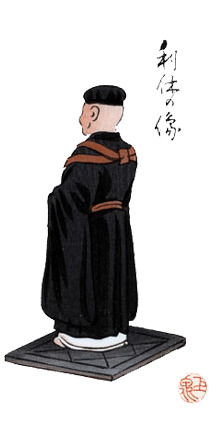| |
| |
The characters wa
kei sei jaku as written by Dr. Genshitsu Sen, fifteenth-generation
Grand Master of the Urasenke Tradition of Chanoyu.
(Reproduction prohibited.)
The Philosophy of Chado
The underlying philosophy of Tea evolved from Zen Buddhism.
Zen is the Japanese counterpart of the Chinese word chan,
which is a translation of the Sanskrit word dhyana, meaning
the meditation that leads to deep spiritual insight. Both
Tea and Zen emphasize a way of training body and mind in
awareness that has potential to become a rigorous spiritual
discipline. Urasenke founder, Sen Rikyu (1522-1591) summarized
the principles of the discipline of Tea into four concepts:
wa, kei,
sei, and
jaku.
|

|
Wa (harmony)
This word connotes a feeling of oneness with nature and people.
At a tea gathering, harmony plays between host and guest,
guest and guest, mood and season, the food served and the
utensils used. Sensitivity to the changing rhythms of the
seasons, and harmony with these changes are once source of
ever deepening pleasure in the practice of Tea. The unpredictable
nature of weather is an integral part of a tea gathering and
is not to be shut out, ignored, or considered inconvenient.
This harmony with nature quietly leads one to an understanding
of the evanescence of all things and the unchanging in the
changing. |
 |
Kei (respect)
Respect results naturally from a feeling of gratitude. Respect
is extended not only to the other people with whom one interacts
but also to one’s daily life, and even to inanimate
objects, such as utensils as a product of human effort or
whatever has come into existence. The etiquette observed in
the tearoom helps a student of Tea to learn to apply the principle
of kei. To the uninitiated what may appear at first as excessively
strict and formal is in actuality a means of incorporating,
internalizing the spirit of respect. The hospitality of the
host, the concern of the guests for each other and the host,
and the careful handling of the utensils exemplify this respect. |
 |
Sei (purity)
Cleanliness and orderliness, in both the physical and spiritual
sense, are a very important part of the study of Tea. Rikyu
must have learned the importance of simple acts of cleaning
in his study of Zen. Even the most mundane acts—washing
dishes or cleaning floors—are the seeds of enlightenment.
In the words of a man of eighth-century China, “How
wondrous this, how mysterious! I carry fuel, I draw water.”
When the host cleans the tea utensils, he or she is simultaneously
purifying heart and mind through total concentration on this
task. The guests, before entering the tearoom, pass along
a garden path and rinse their hands and wash out their mouths
at the low stone water-basin, thereby purifying themselves
of the “dust” of the everyday world outside the
tearoom. Sei also implies simplification, that is, the elimination
of all unnecessary elements. The appearance of the garden
path and tearoom are examples of this kind of simplicity.
|
 |
Jaku (tranquility)
It is often remarked in the practice of Tea that, although
a person can work towards attaining the first three principles,
the last cannot be attained by direct effort. However through
a constant practice of harmony, respect and purity, a person
whose heart inclines towards Tea is prepared to approach
the utter stillness and silence of jaku. This tranquility
is far from a dreamy psychological state. Instead it is
the dynamic force of one’s innermost being that infuses
the practice of Tea and gives significance to the tea gathering,
similar to the words of one of Sen Rikyu’s predecessors,
“be heart’s master, not heart mastered.”

|
|
|
 |

|
|